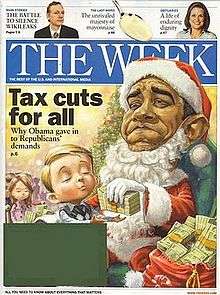The Week
The Week is a weekly news magazine with editions in the United Kingdom and United States. The British publication was founded in 1995 and the American edition started in 2001; an Australian edition was published between 2008 and 2012. A children's edition, The Week Junior, has been published in the UK since 2015.
 Cover of an issue from December 2010 (United States edition) | |
| Editors-in-chief | Jeremy O'Grady (United Kingdom edition) William Falk (United States edition) |
|---|---|
| Categories | News magazine |
| Frequency | Weekly |
| Publisher | Adam Dub (United States edition) |
| Total circulation (2016) | 206,251 (UK)[1] 578,163 (US)[2] |
| First issue | 1995 (UK edition) April 2001 (US edition) October 2008 (Australian edition) |
| Final issue | October 2012 (Australian edition) |
| Company | Dennis Publishing (UK edition) The Week Publications (US edition) |
| Country | United Kingdom, United States Australia (formerly) |
| Based in | New York City, New York (United States edition) |
| Language | English (all editions) |
| Website | theweek.co.uk (UK edition) theweek.com (US edition) |
| ISSN | 1533-8304 |
History
The Week was founded in the United Kingdom by Jolyon Connell (formerly of the right-of-centre Sunday Telegraph) in 1995.[3] In April 2001, the magazine began publishing an American edition;[3][4] and an Australian edition followed in October 2008. Dennis Publishing, founded by Felix Dennis, publishes the UK edition and, until 2012, published the Australian edition. The Week Publications publishes the U.S. edition.
Since November 2015 The Week has published a children's edition, The Week Junior, a current affairs magazine aimed at 8 to 14 year olds.[5][6]
The Australian edition of The Week ceased operation in October 2012. The final edition, its 199th, was released on 12 October 2012. At the end, it was selling 28,000 copies a week, with a readership of 83,000.[7]
Content
The various editions of the magazine provide perspectives on the week's current events and other news, as well as editorial commentary from global media, with the intent to provide readers with multiple political viewpoints. In addition to the above, the magazine covers a broad range of topics, including science, technology, health, the media, business and the arts.
Website
In September 2007, the magazine's U.S. edition launched a daily website. First called THEWEEKDaily.com, Harold Maass editor, Ken Switzer was associate editor, Peter Weber was contributing editor, Obele Brown-West was online marketing manager and Kate Goebel, online account manager. Now called TheWeek.com and edited by Ben Frumin, the daily website carries the mission of the print magazine to the Internet, but also publishes original commentary from writers including David Frum, Robert Shrum, Will Wilkinson, Ryan Cooper, Daniel Larison, Ed Morrissey, and Brad DeLong. The UK website, which was first published under the name The First Post, is edited by Holden Frith.[8]
References
- "Mag ABCs: Full circulation round-up for the first half of 2013". Press Gazette. 15 August 2013. Retrieved 7 December 2013.
- "eCirc for Consumer Magazines". Alliance for Audited Media. 31 December 2015. Retrieved 1 June 2016.
- "The 20 Best Magazines of the Decade (2000-2009)". Paste Magazine. 26 November 2009. Retrieved 10 August 2015.
- Steve Black (2009). "Life spans of Library Journal's 'Best Magazines of the Year'". Serials Review. 35 (4): 213–217. doi:10.1080/00987913.2009.10765248.
- "The Week to launch children's magazine: The Week Junior". The Week. Retrieved 22 August 2017.
- "The Week Junior". School Library Association. Retrieved 22 August 2017.
- "The Week calls it a day". The Australian. 2012. Retrieved 29 October 2012.
- Tingle, Rory (6 July 2015). "The Week expands website editorial team to 12 as it exceeds 2m browsers per month". Press Gazette. Retrieved 22 May 2016.